Yes, this is the review for Mass Effect 2. No, you aren’t dreaming (though props to you if you dream about my blog). The entry is so big that I decided to break it up into three parts, each covering specific aspects of the game. I’ll add links to the other entries when I post them.
Part 1: What is Mass Effect 2?
Part 2: Graphics, Music and Voice Acting
Part 3: Gameplay and Final Verdict
Part 1: So what is Mass Effect 2?
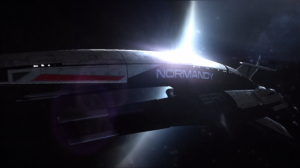
The player takes on the role of Commander Shepard, captain of the starship Normandy. The Normandy is the player's gateway to the Mass Effect universe.
Mass Effect 2 is a third-person action/role-playing hybrid game developed by Bioware and released a year ago, almost to the day of this review (26 January 2010 in the United States). The Mass Effect universe is classic space opera at its finest. Having discovered ancient mass effect technology hidden away on the non-planet Pluto’s moon Chiron, Humanity reached the stars, only to find themselves on a stage crowded with alien species. Some of the aliens have banded together to form a United Nations-style organization for interspecies government, the Citadel Council. Communication and trade across the galaxy is made possible through the miracle of mass relays, superstructures left behind by a now-extinct species that act as interstellar gateways. At the crossroads of these paths is the Citadel, a massive space station that is home to several million beings. It is the caput mundi (or rather, caput stellarum) of the Mass Effect universe; it is the seat of government, center of commence, and focal point of interspecies politics.
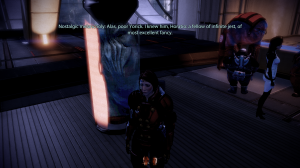
“Nostalgic melancholy: Alas, poor Yorick, I knew him, Horatio: a fellow of infinite jest, of most excellent fancy.”
Each species of alien has their own quirks and history: Krogan are the genetically enhanced descendants of the heroes from Nintendo’s classic, Battletoads; Salarians are short-lived, fast-talking scientist types with *ahem* moral flexibility; Turians are militaristic lizards; Asari are blue, exclusively female, well busted, and able to get it on with any species (of course); and Elcor are large, four-legged creatures who use scents to communicate their expressions, and must therefore preface all of their sentences with their emotional state to avoid interspecies miscommunication. With sincerity: cool.
The Reapers are also out there. Reapers are ancient, enormous, cybernetic, sentient starships, who slumber outside of the Milky Way in dark space, and who monitor the progress of sentient species throughout the galaxy. When they determine that civilization has progressed sufficiently far enough to be useful to them but not too far as to endanger them, they emerge and harvest (eradicate) all sentient life in the galaxy, only to slip back into dark space without leaving a trace of their existence. And they’ve decided it’s time to come again.
The player takes the role of Commander Shepard, Captain of the starship Normandy, and must work to discover why entire colonies of humans are disappearing. Could they be connected somehow to the Reapers?
(My guess is an emphatic yes).
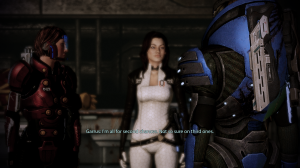
Commander Shepard, Miranda, and Garrus discuss their options. Character interactions are an integral part of the Mass Effect experience.
The main storyline in the game itself follows Commander Shepard’s efforts to build an elite team for a suicide mission. Characters will join the team based upon Shepard’s actions, and in some cases will leave the team altogether. As the team grows, the player also has the option to complete “loyalty missions,” which are elaborately crafted missions which expand upon the back story of a particular character, revealing their secrets and allowing the character to gain closure on outstanding emotional issues. Depending on how the mission goes, the character may feel closer than ever to Shepard, or be disgusted and distrustful. It all depends on player choice.
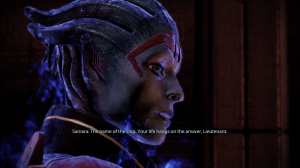
The characters' personalities run the gamut from near-insanity to completely in control, if in a very scary way. Samara is the latter, if you couldn't tell.
The entire Mass Effect universe gives off a sense of despair. Numerous planets that the player visits have been ravaged by war and time; several planets have remnants of civilizations long extinct. Many aliens are anti-human species-ists who consider Humans the upstarts of the galaxy, or just generally hate all of the Council races. Then there is the sinking feeling given off by the Reapers themselves: gigantic, unfeeling, absolutely mechanical and strategic in thought and ruthless in execution, nearly indestructible… what can Humanity do to halt such monsters? The story told is a dark one, indeed.
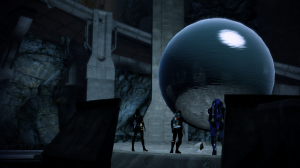
Mass Effect 2 draws heavily from its science fiction roots. This looks like it is going to end well.
Another great trait of the Mass Effect universe is how often it plays with classic science fiction icons, tropes, and stereotypes. Throughout the game, the player can run into references to classics such as 2001: A Space Odyssey, Starship Troopers, Dune, Sphere, Terminator, and Ender’s Game, to name just a few. If stealing ideas and tropes is the highest form of flattery, then Bioware is putting the moves on science fiction like it’s nobody’s business. The Reapers themselves are reminiscent of Lovecraft’s Cthulu mythos: ancient beings, sleeping out in space, with the power to subtly (or unsubtly) control the minds of lessor beings and drive them to insanity.
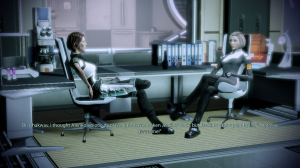
Some of the game's best moments are such as this: hearing a bit about the backstory of a character over a nice glass of wine (or three).
One very cool thing about the game is that it allows the player to import their character from Mass Effect. This import file saves the decisions made by the player, which directly impact events in the game. I used this feature and I have to say I was impressed. There were a number of times when someone would come up to me and say, “Oh hey, Shepard! Remember me? I’m XXrandomcharacterXX. You saved me back on XXrandomplanetXX. You are so nice.” Or something along those lines. It’s nice that the game saves both the plot-heavy events as well as the smaller, personal events.
Overall, Mass Effect 2 has one of the strongest stories of any game that I’ve played. Its characters are compelling and multidimensional. The universe is finely tuned down to the smallest detail; it is rich with history, interspecies tension, romance, but most of all a dark sense of foreboding that permeates throughout the entire game. The story is absolutely epic and wonderful to experience, from the opening sequence to the final, edge-of-your-seat climax that is the most powerful emotional moment in gaming that I’ve played. I am hugely excited for Mass Effect 3, which will conclude the story, influenced by dozens of decisions that the player has made in the first two games. Put simply, Mass Effect 2‘s story rocks.
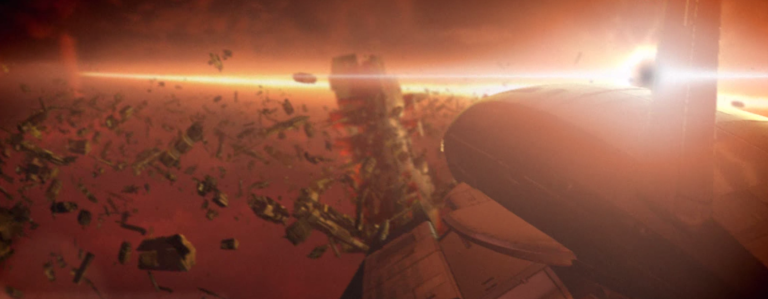
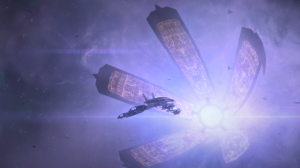
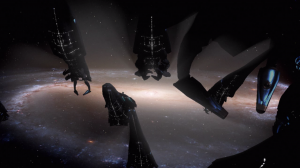
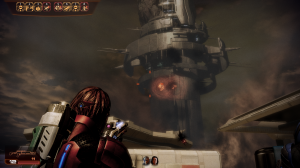
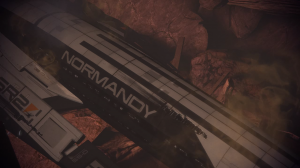
Comments
Landan said: 2 February 2011 at 10:06
Great review, Dan! I played through the first Mass Effect twice and loved the story and gameplay. This has definitely encouraged me to get my hands on the second game.
Sunhawk said: 3 February 2011 at 15:47
Hi Landan,
Thanks for the props! And if you even remotely liked ME1, then you’re going to be in love with ME2. It’s well worth the price of admission.